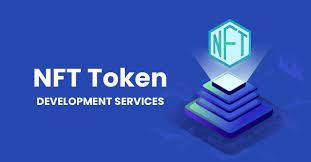.jpeg)
In the ever-evolving landscape of blockchain technology, Non-Fungible Tokens (NFTs) have emerged as a transformative force, revolutionizing how we perceive ownership and digital assets. As NFTs continue to gain traction, businesses venturing into NFT token development must be cognizant of the legal considerations that come with this innovative technology.
Why Complying with Legal Elements is Crucial for NFT Businesses
Navigating the legal landscape is imperative for NFT businesses to ensure sustainable growth and mitigate potential risks. Here's why abiding by legal elements is crucial for those delving into NFT token development:
- Protection of Intellectual Property Rights
NFTs often involve the representation of unique digital assets, including art, music, and collectibles. Adhering to legal frameworks safeguards creators' intellectual property rights, preventing unauthorized use and distribution.
- Regulatory Compliance Builds Trust
Compliance with legal regulations fosters trust among users, investors, and stakeholders. NFT businesses that operate within legal boundaries are more likely to attract partnerships and collaborations, creating a foundation for long-term success.
- Mitigation of Legal Risks
Legal compliance helps in identifying and mitigating potential legal risks. Understanding the legal nuances surrounding NFTs shields businesses from lawsuits and regulatory penalties, ensuring a stable operational environment.
- Investor Confidence
Investors are increasingly discerning when choosing NFT projects to support. Adhering to legal considerations instills confidence in investors, reassuring them that their investments are secure and backed by a legally sound foundation.
- Long-Term Viability
Legal compliance is not just a short-term necessity but a key factor in ensuring the long-term viability of NFT businesses. Building a sustainable model that considers legal elements contributes to the industry's overall credibility and growth.
Key Regulatory Elements NFT Entrepreneurs Should Note
To successfully navigate the legal landscape, NFT entrepreneurs must be well-versed in the major regulatory elements that govern NFT token development in 2023. Here are ten crucial subpoints to consider:
- Data Protection Regulations
As NFTs often involve the handling of personal information, compliance with data protection regulations, such as GDPR, is paramount. Implementing robust data protection measures ensures user privacy and legal adherence.
- Anti-Money Laundering (AML) Compliance
NFT businesses must implement stringent AML measures to prevent their platforms from being exploited for money laundering activities. Collaborating with regulatory bodies and staying updated on AML requirements is essential.
- Smart Contract Audits
Smart contracts form the backbone of NFTs. Conducting regular audits ensures the security and functionality of smart contracts, mitigating the risk of vulnerabilities and legal repercussions.
- Token Classification
Understanding the legal classification of NFTs is crucial. Different jurisdictions may categorize tokens differently, impacting tax implications and regulatory requirements. NFT entrepreneurs should seek legal counsel to navigate these distinctions.
- Consumer Protection Laws
NFT platforms must adhere to consumer protection laws to safeguard users' rights. Transparent terms of service, clear communication, and fair business practices contribute to compliance with consumer protection regulations.
- Securities Regulations
In some cases, NFTs may be classified as securities. NFT entrepreneurs should be aware of securities regulations and seek legal advice to ensure compliance with these complex and evolving laws.
- Copyright and Licensing
Ensuring proper licensing and adherence to copyright laws is crucial, especially in the creation and trading of digital assets. NFT businesses should obtain the necessary permissions and licenses to avoid legal disputes.
- Jurisdictional Variances
NFT entrepreneurs must be aware of jurisdictional differences in regulations. What may be compliant in one region might not be in another. Tailoring business practices to meet diverse regulatory requirements is essential.
- Taxation Considerations
Taxation laws surrounding NFTs can be intricate. Entrepreneurs must navigate tax implications related to token creation, sales, and transactions. Professional tax advice is advisable to ensure compliance and minimize liabilities.
- Ethical Considerations
Beyond legal requirements, NFT businesses should also consider ethical implications. Building a positive reputation within the community requires ethical behavior, transparency, and a commitment to responsible NFT development.
Business Models Aligned with Legal Regulations in NFT Development
To thrive in the NFT ecosystem, businesses must adopt models that align with legal regulations. Here are innovative approaches that adhere to legal considerations:
- Collaborative Legal Partnerships
Forming partnerships with legal experts and compliance firms ensures ongoing legal counsel. This proactive approach helps businesses stay ahead of regulatory changes and maintain compliance.
- Transparency in Token Creation
Maintaining transparency in the creation and distribution of NFTs builds trust. Providing clear information on the origin, ownership, and licensing of digital assets fosters a compliant and trustworthy ecosystem.
- Decentralized Governance
Implementing decentralized governance models empowers the community to participate in decision-making. This not only aligns with the ethos of blockchain but also distributes legal responsibilities across a broader network.
- Continuous Regulatory Monitoring
Establishing mechanisms for continuous monitoring of regulatory changes is vital. NFT businesses should have dedicated teams or tools in place to track legal developments and adapt their operations accordingly.
- Legal Education Initiatives
Educating users, creators, and stakeholders about legal considerations enhances overall compliance. Providing resources, tutorials, and seminars on legal aspects fosters a community that is well-informed and aligned with legal requirements.
Final Thoughts
The success of NFT businesses hinges on their ability to navigate the complex legal landscape surrounding token development. By understanding and adhering to regulatory elements, businesses can build trust, attract investors, and ensure the long-term viability of their operations.
As the NFT space continues to evolve, staying abreast of legal considerations will be instrumental in fostering a sustainable and compliant ecosystem. NFT entrepreneurs should view legal compliance not as a hindrance but as a strategic imperative for the growth and acceptance of this revolutionary technology.
In the dynamic world of NFTs, those who prioritize legal considerations will not only thrive but also contribute to the maturation and legitimacy of the entire industry.